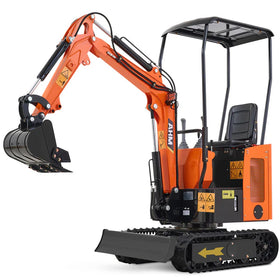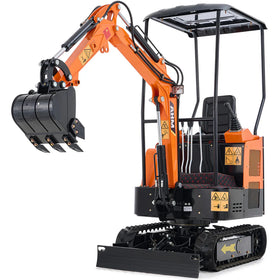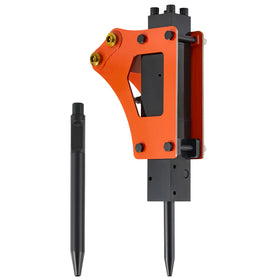Just like hydraulic fluid keeps your mini excavator alive, the difference of diesel vs gas engine determines its lifespan and performance. Here’s how to pick wisely.
Step 0: Consider Actual Machine Specifications

When comparing mini excavators, focus on actual specifications rather than marketing size designations.
Similar machines may be marketed with different size classifications (like a 1.8 vs 1.2), yet have nearly identical boom lengths, track widths, and operational capabilities. Always measure:
- Actual track width (typically around 3 feet)
- Boom reach and dimensions
- Machine weight
- Undercarriage design
Step 1: Understand Your Work Requirements
Diesel Engines (e.g., Kubota):
- Best for: Heavy-duty tasks like trenching rocky soil or operating 8+ hours daily.
- Why it matters: Diesel torque handles constant strain without overheating. Road crews rely on them for multi-day projects.
- Consequences of misuse: Using diesel for light tasks wastes fuel and increases upfront costs.
Gas Engines (e.g., Briggs & Stratton):
- Best for: Quick jobs (fence posts, landscaping) or intermittent use.
- Why it matters: Lighter weight and easier startup suit fast-paced sites.
- Consequences of misuse: Gas engines struggle in deep clay or prolonged use, leading to premature wear.
Step 2: Calculate Long-Term Costs

Fuel Efficiency:
Diesel:
- Burns 1.5–2 gallons/hour. A septic contractor saved $1,800/year switching from gas.
Gas:
- Burns 3–4 gallons/hour. Cheaper upfront but costs 40% more in fuel for full-time use.
Diesel vs Gas Maintenance Difference:
Diesel:
- Pro: Fewer breakdowns under heavy loads.
- Con: Repairs cost 2x more (e.g., $1,500 injector replacement).
Gas:
- Pro: DIY-friendly (e.g., $20 spark plugs).
- Con: More frequent oil changes (every 100 hours vs. 250 for diesel).
Step 3: Evaluate Job Site Conditions
Noise Restrictions:
- Diesel: 85 dB – banned in residential zones like [Your City].
- Gas: 72 dB – passes most neighborhood ordinances.
Weather Resilience:
- Diesel: Requires block heaters below -5°C. One crew lost $1,300 in downtime forgetting theirs.
- Gas: Starts instantly in freezing temps. Ideal for winter landscaping.
Step 4: Check Resale Value & Regulations
- Diesel: Resells for 60–70% of original price if serviced at dealers.
- Gas: Loses value faster but sells quicker on Craigslist.
Regulatory Tips:
- Diesel emissions laws vary by state. Cities like Memphis and Toronto have noise restrictions that may limit the operation of diesel-powered machinery.
- Gas meets all 50-state EPA standards.
Step 5: Make Your Decision
Choose Diesel If:
✓ Daily use (30+ hours/week)
✓ Heavy materials (clay, rock)
✓ Dealer repair access
Choose Gas If:
✓ Part-time or varied tasks
✓ Noise-sensitive areas
✓ DIY maintenance
Why Engine Choice Impacts Your Machine's Longevity

Using the wrong engine type is like running contaminated hydraulic fluid – it slowly damages components. Diesel engines bogged down by light tasks develop carbon buildup; gas engines overworked on heavy jobs overheat seals and pumps.
Need Help?
Share your:
- Weekly workload
- Typical materials (clay, gravel, etc.)
- Budget for fuel/maintenance
We’ll recommend the engine that matches your needs – no upsells, just data from 10+ years servicing AHM excavators.
Explore AHM Mini Excavators
AHM Diesel and Gas models are built for clarity and reliability. Filter by engine type, noise ratings, or project size to find your fit.







